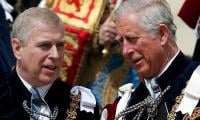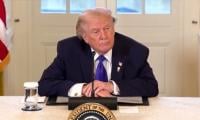Stay extension refusal to Nawaz: Is ex-PM’s absence more beneficial for PML-N or PTI?
ISLAMABAD: The Pakistan Muslim League-Nawaz (PMLN) is trying to put a brave face on the setback it recently suffered due to the refusal by the British authorities to extend the stay of its supreme leader Nawaz Sharif in the UK.
The refusal was not the upshot of any efforts by the Imran Khan government but was the result of the British system. While declining the request, it was stated that the aggrieved person can approach the immigration tribunal. The deposed prime minister has several legal options to exercise to get the UK Home Office’s judgment overturned, a process that will take a long time. The ultimate decision can go either way, but odds are that Nawaz Sharif will eventually get relief.
Usually, the rejection of such a plea doesn’t make the news. But since it pertained to a three-time elected prime minister, it hit the headlines, especially in Pakistan, and became a hot topic of discussion.
It may be a mere coincidence that the report about the stay extension decline was flashed from London when the PMLN was still nursing the wounds caused by the results of the Azad & Jammu Kashmir (AJK) elections and the Sialkot by-poll. Both had shocked the party, particularly the AJK finish, as it believed that it had pulled off larger campaign rallies than its opponents.
Not long after his departure from Pakistan, the incumbent government started attempting to bring Nawaz Sharif back -- or at least such an impression was given. Even Prime Minister Imran Khan spoke multiple times about this desire, mocking Nawaz Sharif’s illness and declaring that he would personally talk to his British counterpart for his repatriation to Pakistan. The interior ministry also put in its own contribution to the effect, spawning zero results.
The former premier departed from Pakistan for London in an air ambulance in November 2019 due to his critical health condition after the Lahore High Court allowed his travel abroad following a decision of the federal cabinet to strike off his name from the Exit Control List (ECL). At the time, everyone in the government, because of the conclusive reports of medical experts mostly belonging to the government, was extremely concerned about Nawaz Sharif’s seriously deteriorating health. They were scared that they would be held responsible if anything untoward happened to him.
Prior to that, credible reports kept circulating that Nawaz Sharif had repeatedly been urged through different channels to remain out of Pakistan for a few years along with his aggressive daughter Maryam Nawaz. But he had always dismissed the suggestion. His health condition had aggravated because of his refusal to accept this offer.
It will be instructive to have a look at the political implications of the former premier’s further stay in Britain as well as return to Pakistan. For the time being, he is unlikely to come back when the set-up that brought untold woes to him, his family members and his party leaders is well-entrenched, and when there is no doubt that the next general elections would be held in 2023. Theoretically, snap parliamentary polls can be announced if the present dispensation decides to take such a decision. It will do so only when it is over-confident like Zulfikar Ali Bhutto in 1977 that it will win hands down. Apparently, there are not very bright prospects for such a happening. Therefore, there is no point in the former prime minister’s immediate homecoming.
It is believed that the state of his health at this old age permitting, Nawaz Sharif is most likely to come back to Pakistan on the eve of the next parliamentary polls otherwise his party might be in big trouble. By that time, he is expected to undergo the essential surgeries that are recommended. There is also a feeling within the PMLN that certain changes in the current set-up will take place by that time. Its assumption is that it will also be able to get some guarantees for fair and free elections by then. For quite some time, its principal efforts have been directed at securing a level playing field in the next parliamentary polls. For the time being, the PML-N would have to swallow the derision and ridicule of the Pakistan Tehreek-e-Insaf (PTI) over the ex-premier’s continued stay abroad. His party continues to respond to such taunts every day.
Nawaz Sharif’s absence from Pakistan has provided the PTI a hammer to strike at its chief political rival. But the ruling party does realize that if Nawaz comes back on his own or is brought back to Pakistan, his incarceration will produce no political dividends for it. Rather, his confinement will be beneficial for the PML-N. Its endeavours to get him repatriated are meant mainly for public consumption as this way it is hurting the PMLN politically and benefiting the PTI.
Just two weeks before polling day in 2018, Nawaz Sharif, accompanied by Maryam Nawaz, had rushed back into Pakistan from Britain after being sentenced by an accountability court in the London apartments’ reference.
He had thus announced to all and sundry that he was not scared of imprisonment. Additionally, the primary objective behind his return was to give a boost to the PMLN’s election campaign for the July 25 general elections. It is felt that had he not adopted the aggressive strategy and the ‘respect the vote’ narrative, his party would not have secured as many federal and Punjab seats as it had done with his presence behind bars. The docility would have cost the PMLN heavily. Moreover, it might have faced divisions within its ranks.
Although the “war of narratives” within the party has been at its peak for the past few weeks (a war which even otherwise has always been present in it) its only unifying factor is Nawaz Sharif as every side publicly declares that he is the ultimate decision-maker and has the last say in party matters. The PTI is currently projecting the differences prevailing in the PMLN and is more concerned about them rather than highlighting its own performance and achievements. It has used this battle of narratives as a successful diversionary tactic.
Back in December 2000 when Nawaz Sharif had flown to exile in Saudi Arabia during Pervez Musharraf’s reign, both sides were content that he had gone away. The Sharif family was happy that its leading members had got away from a dangerous situation.
The military regime was pleased that a thorn in their side had exited Pakistan and now it could rule in peace without any formidable challenge. That was the time when Begum Kulsoom Nawaz had for the first time run an effective campaign against the government in the early days of martial law. She was the only opposition leader challenging the military set-up while the other major political force, the Pakistan People’s Party (PPP), had, initially welcomed the imposition of martial law.
It later repudiated its earlier policy when the same stick was employed against its leaders, including Benazir Bhutto and Asif Ali Zardari. In the following years, Nawaz Sharif had kept trying to stage a comeback in Pakistan while Musharraf struggled to block his return. However, a time came when it was beyond his control to stop the former prime minister's homecoming.
-
 Bradley Cooper's Surgery Denials Make Things Even Worse
Bradley Cooper's Surgery Denials Make Things Even Worse -
 Nintendo Mario Toy Ads Spark Generative AI Controversy
Nintendo Mario Toy Ads Spark Generative AI Controversy -
 OpenAI, Common Sense Media Back AI Safety Ballot: What It Means For Kids & Parents
OpenAI, Common Sense Media Back AI Safety Ballot: What It Means For Kids & Parents -
 Apple And Google Face Scrutiny Over X Deepfake Content
Apple And Google Face Scrutiny Over X Deepfake Content -
 Andrew Likely To Plunge Royal Family Into Fresh Crisis As Former Duke Weighing Major Offer
Andrew Likely To Plunge Royal Family Into Fresh Crisis As Former Duke Weighing Major Offer -
 'Mixed Dementia' Myth Debunked By Expert
'Mixed Dementia' Myth Debunked By Expert -
 Roger Ewing, 'Gunsmoke' Actor Dies At 83
Roger Ewing, 'Gunsmoke' Actor Dies At 83 -
 Friends Warn Meghan Markle About Prince Harry As Duke Plans Olive Branch To King Charles
Friends Warn Meghan Markle About Prince Harry As Duke Plans Olive Branch To King Charles -
 Sarah Ferguson Slammed As Her Exit Strategy Falls Apart
Sarah Ferguson Slammed As Her Exit Strategy Falls Apart -
 Australia On Alert: State Of Disaster Declared As Victoria’s Bushfires Rage
Australia On Alert: State Of Disaster Declared As Victoria’s Bushfires Rage -
 Bucks Vs Lakers: Giannis, Dončić Headline Tight Contest In Los Angeles
Bucks Vs Lakers: Giannis, Dončić Headline Tight Contest In Los Angeles -
 David, Victoria Beckham Want To Mend Ties With Brooklyn, Nicola Peltz: Source
David, Victoria Beckham Want To Mend Ties With Brooklyn, Nicola Peltz: Source -
 Germany Plans Fast-track Measures To Combat AI-driven Image Manipulation
Germany Plans Fast-track Measures To Combat AI-driven Image Manipulation -
 Daniel Stern, 'Home Alone' Star, Cited By Police In Alleged Prostitution Sting
Daniel Stern, 'Home Alone' Star, Cited By Police In Alleged Prostitution Sting -
 US Arctic Strategy: Trump Threatens To Take Greenland ‘the Hard Way’
US Arctic Strategy: Trump Threatens To Take Greenland ‘the Hard Way’ -
 Kate Middleton's Smart Beauty Choices At 44 Revealed
Kate Middleton's Smart Beauty Choices At 44 Revealed



